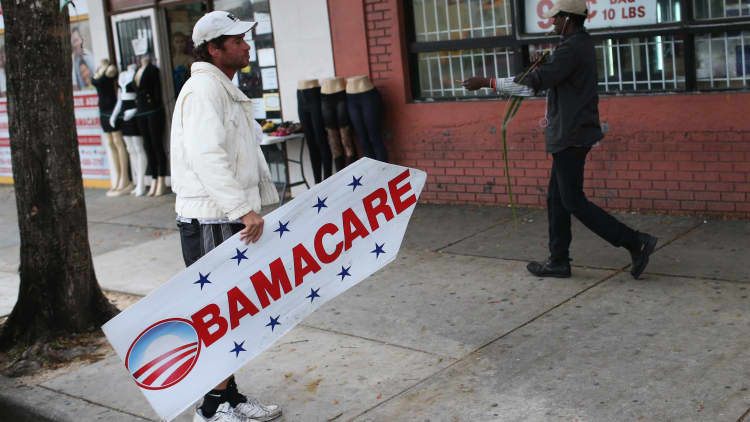
Before Obamacare, Alex Travison went without health insurance for years. After getting laid off from GM more than a decade ago, he couldn't afford the coverage.
"I didn't have any major health issues in that time, but I did have to see my doctor every so many months to get my prescriptions filled for my high blood pressure," Travison said during a recent visit to his doctor's office at the Venice Family Clinic in Los Angeles.
Now, with government subsidies, he pays about $50 a month for coverage on an exchange plan, an arrangement he said has worked well for him. However, he's worried he'll lose his coverage if the Trump administration and Republican Congress make good on their promise to repeal the Affordable Care Act.
"I'm a 64-year-old man, and things happen very quickly sometimes ... with your health," he said. "I believe that to take away these benefits from us at this (time) borders on criminal."
It's a concern the staff at the Venice Family Clinic is hearing a lot this month from the low-income patients they see. On Friday, as one of his first official acts, President Donald Trump signed an executive order that would allow officials to "minimize [Obamacare's] economic burden."
"Our patients are very concerned about … their health insurance in the future," said Liz Benson Forer, CEO of the Venice Family Clinic. "It's very important that there be some stability in this system as this discussion goes forward."
The Congressional Budget Office estimates that the repeal of Obamacare could result in 18 million Americans losing their health insurance in the first year after the law is overturned — and could leave more than 30 million people without coverage in 10 years.
Still, just days ago, Trump's pick to head the Department of Health and Human Services offered assurances that the administration was committed to maintaining access for the estimated 20 million Americans who have gained coverage under the ACA.
"There's been a lot of talk about individuals losing health coverage. That is not our goal, nor is it our desire, nor is it our plan," Rep. Tom Price, R-Ga., said at his Senate confirmation hearing.
"Nobody is interested in pulling the rug out from under anybody. We believe that it's absolutely imperative that individuals who have health coverage keep health coverage and move, hopefully, to greater choices and opportunities to gain the coverage that they want for themselves or their families," Price said.
However, he offered no details on how the administration would achieve that objective — even as Trump told The Washington Post that he was prepared to give health care "for everyone" as a replacement for Obamacare.
The president and Republicans have promised their replacement plan will be able to provide wide access to coverage and will be cheaper by offering more options.
They liken Obamacare to a big fixed-price buffet, with its required preventive health benefits for every plan and tax subsidies for low-income Americans. The GOP argues that those mandated benefits resulted in high deductibles, narrow networks and big premiums for those who aren't subsidized.
Republicans want to provide an "a la carte" menu, with cheaper plans for people who don't consume a lot of health services, and a standard health insurance tax credit for everyone — regardless of whether they get insurance through their employer or buy it on their own.
They are also proposing bigger tax deductions and options for using Health Savings Accounts to pay for health expenses, including premiums.
Yet for people who require a lot of care and prescriptions, such a shift will require careful planning, said health insurance consultant Carolyn McClanahan.
"The big thing they're going to have to think about [is] if they have a chronic illness, their ongoing expenses are going to be pretty extensive, so they need to have a lot of money set aside," said McClanahan.
Travison worries that for people like him, who don't make enough to save, the new plan may mean going without insurance again.
"It says in our Declaration of Independence 'life, liberty and the pursuit of happiness,'" he said. "And if we don't have health care, I don't have any of that."
"On the Money" airs on CNBC Saturday at 5:30 am ET, or check listings for air times in local markets.



